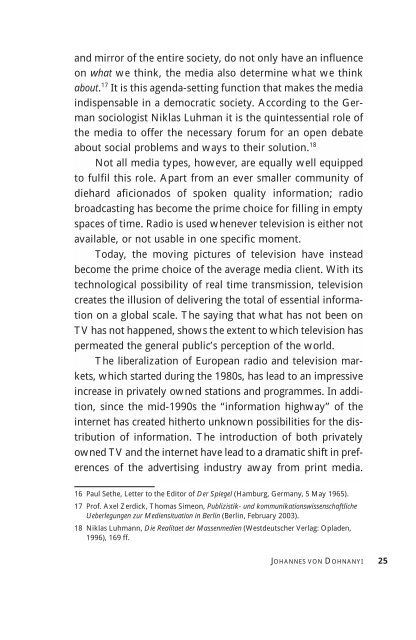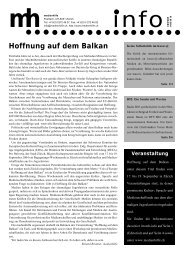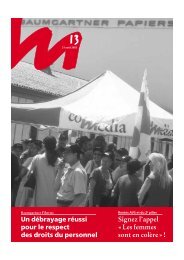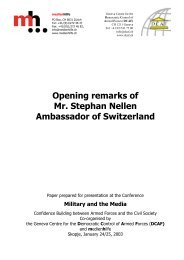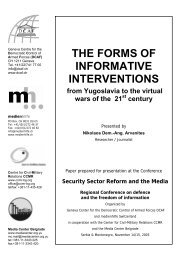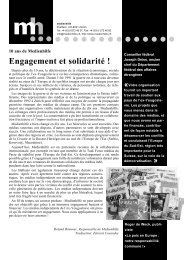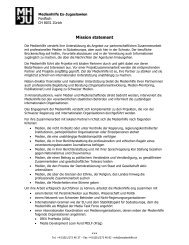The Impact of Media Concentration on Professional ... - OSCE
The Impact of Media Concentration on Professional ... - OSCE
The Impact of Media Concentration on Professional ... - OSCE
Create successful ePaper yourself
Turn your PDF publications into a flip-book with our unique Google optimized e-Paper software.
and mirror <str<strong>on</strong>g>of</str<strong>on</strong>g> the entire society, do not <strong>on</strong>ly have an influence<strong>on</strong> what we think, the media also determine what we thinkabout. 17 It is this agenda-setting functi<strong>on</strong> that makes the mediaindispensable in a democratic society. According to the Germansociologist Niklas Luhman it is the quintessential role <str<strong>on</strong>g>of</str<strong>on</strong>g>the media to <str<strong>on</strong>g>of</str<strong>on</strong>g>fer the necessary forum for an open debateabout social problems and ways to their soluti<strong>on</strong>. 18Not all media types, however, are equally well equippedto fulfil this role. Apart from an ever smaller community <str<strong>on</strong>g>of</str<strong>on</strong>g>diehard afici<strong>on</strong>ados <str<strong>on</strong>g>of</str<strong>on</strong>g> spoken quality informati<strong>on</strong>; radiobroadcasting has become the prime choice for filling in emptyspaces <str<strong>on</strong>g>of</str<strong>on</strong>g> time. Radio is used whenever televisi<strong>on</strong> is either notavailable, or not usable in <strong>on</strong>e specific moment.Today, the moving pictures <str<strong>on</strong>g>of</str<strong>on</strong>g> televisi<strong>on</strong> have insteadbecome the prime choice <str<strong>on</strong>g>of</str<strong>on</strong>g> the average media client. With itstechnological possibility <str<strong>on</strong>g>of</str<strong>on</strong>g> real time transmissi<strong>on</strong>, televisi<strong>on</strong>creates the illusi<strong>on</strong> <str<strong>on</strong>g>of</str<strong>on</strong>g> delivering the total <str<strong>on</strong>g>of</str<strong>on</strong>g> essential informati<strong>on</strong><strong>on</strong> a global scale. <str<strong>on</strong>g>The</str<strong>on</strong>g> saying that what has not been <strong>on</strong>TV has not happened, shows the extent to which televisi<strong>on</strong> haspermeated the general public’s percepti<strong>on</strong> <str<strong>on</strong>g>of</str<strong>on</strong>g> the world.<str<strong>on</strong>g>The</str<strong>on</strong>g> liberalizati<strong>on</strong> <str<strong>on</strong>g>of</str<strong>on</strong>g> European radio and televisi<strong>on</strong> markets,which started during the 1980s, has lead to an impressiveincrease in privately owned stati<strong>on</strong>s and programmes. In additi<strong>on</strong>,since the mid-1990s the “informati<strong>on</strong> highway” <str<strong>on</strong>g>of</str<strong>on</strong>g> theinternet has created hitherto unknown possibilities for the distributi<strong>on</strong><str<strong>on</strong>g>of</str<strong>on</strong>g> informati<strong>on</strong>. <str<strong>on</strong>g>The</str<strong>on</strong>g> introducti<strong>on</strong> <str<strong>on</strong>g>of</str<strong>on</strong>g> both privatelyowned TV and the internet have lead to a dramatic shift in preferences<str<strong>on</strong>g>of</str<strong>on</strong>g> the advertising industry away from print media.16 Paul Sethe, Letter to the Editor <str<strong>on</strong>g>of</str<strong>on</strong>g> Der Spiegel (Hamburg, Germany, 5 May 1965).17 Pr<str<strong>on</strong>g>of</str<strong>on</strong>g>. Axel Zerdick, Thomas Sime<strong>on</strong>, Publizistik- und kommunikati<strong>on</strong>swissenschaftlicheUeberlegungen zur Mediensituati<strong>on</strong> in Berlin (Berlin, February 2003).18 Niklas Luhmann, Die Realitaet der Massenmedien (Westdeutscher Verlag: Opladen,1996), 169 ff.JOHANNES VON DOHNANYI 25


